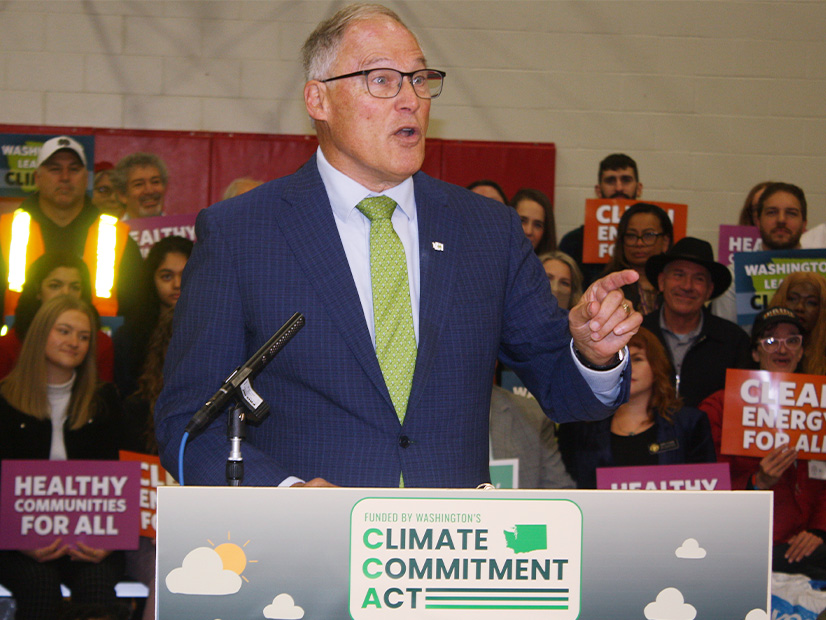Washington state expects to collect $941 million in extra cap-and-trade money in the first half of 2024, bringing the overall income to roughly $3 billion over the system’s first 18 months.
The Washington Legislature already has appropriated $2.1 billion of previously predicted “cap-and-invest” income for its fiscal biennium, which runs from July 1, 2023, to June 30, 2025. Most of that money is going to climate change mitigation projects.
The state is on track to gather roughly $2 billion in calendar 2023. That’s more than $1 billion greater than what the Legislature expected when it originally approved the program in 2021.
The newly predicted $941 million will be added to Gov. Jay Inslee’s 2024 supplemental budget request to the Legislature in January — a tweaking of the approved 2023-2025 biennial budget. It’s up to the Legislature whether it will approve some or all of that request.
Inslee’s request includes:
-
- A one-time $200 credit to the utility bills of roughly 750,000 low- and moderate-income households in Washington.
- Speeding up the transition from diesel school buses to electric zero-emission school buses across the state.
- Installing electric heat pumps in low-income multiple-family homes, replacing gas heat.
- Providing matching funds for competitive federal grants to obtain clean-energy jobs.
- Converting a large diesel ferry into to a hybrid fuel-electric ferry.
Washington’s ferries are breaking down in increasing numbers. Inslee said Dec. 11 that future cap-and-invest income could speed up replacing the old ferries with new hybrid ferries.
Legislative Priorities
Also Dec. 11, state officials unveiled Inslee’s top three climate-relate bills for the 2024 session.
The first bill — modeled after a new California entity — would create a division of petroleum market oversight under the Washington Utilities and Transportation Commission. “We’re gonna pass the transparency law so we are not victimized by the oil companies,” Inslee said at his press conference.
Inslee has been heavily criticized because the bid prices on Washington’s allowance have been linked to increased gasoline prices in the state.
The oversight entity would require details on fuel pricing, profit margins and transaction data by fuel suppliers, refinery operations and others in the fuel supply chain. The new office would analyze that information. The bill likely would explore setting up fines for collusion, shutting down fuel chain equipment and other forms of market manipulation, officials said in a press briefing prior to Inslee’s comments.
“This is to simply unpack the black box of how oil companies set their prices. … Who’s selling to whom, at what volume?” asked Becky Kelly, Inslee’s climate change policy adviser.
The Inslee administration contends the five biggest oil corporations made $200 billion in profits in 2022. “We’re not gonna surrender to the oil companies,” Inslee said.
The second bill would have Washington officials explore compatibilities with the cap-and-trade programs in California and Quebec, to try to stabilize carbon prices and shrink the costs of buying allowances. The California-Quebec coalition is the only other cap-and-trade market in the United States or Canada.
The meshing of the two systems would have to be addressed. For example, Washington limits a bidder to try to buy 10% of the available allowances per quarter. The California-Quebec alliance limits that to 25%.
A recent Ecology Department preliminary analysis concluded the proposed linkage likely would improve the cap-and-invest program’s economic durability, longevity and efficacy.
“In a larger, more liquid market with a greater number of participants, allowance prices would likely be lower and change more predictably. Predictable prices can foster greater investments in decarbonization,” the report said.
The third legislative effort is reviving House Bill 1589 by Rep. Beth Doglio (D) to limit methane emissions from landfills. The bill is aimed at encouraging Washington’s largest utility, Puget Sound Energy — which uses methane in some instances — to switch to other electric sources.



